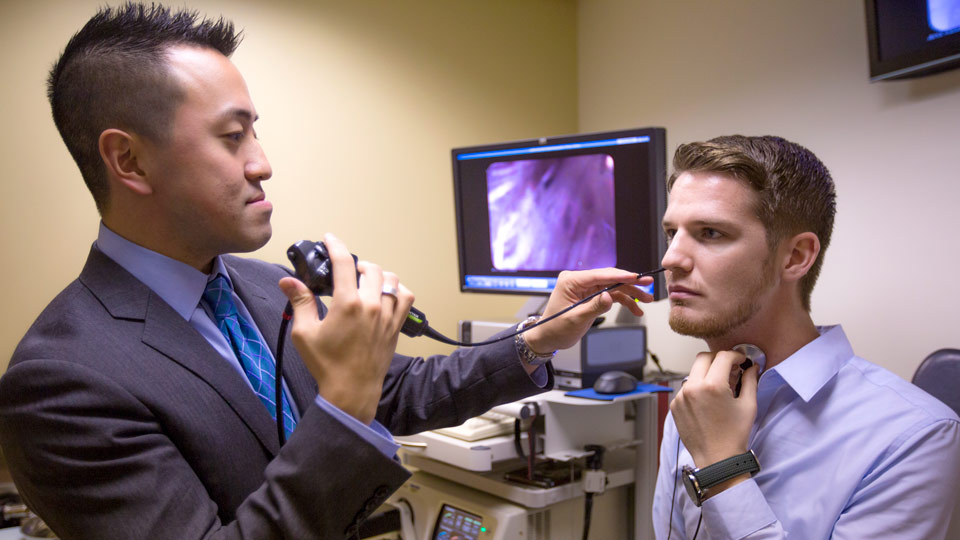Otolaryngology Insights: What Patients Should Know
Otolaryngology Insights: What Patients Should Know
Blog Article
Exploring the Field of Otolaryngology: What to Expect When You Speak With an ENT
Otolaryngology, frequently described as ENT, includes the diagnosis and treatment of nose, ear, and throat conditions. For those experiencing related issues, getting in touch with an ENT expert can provide quality and relief. Recognizing what to anticipate throughout such consultations is necessary for reliable communication and treatment. This review will outline essential facets of the ENT experience, consisting of typical factors for gos to and the procedures associated with medical diagnosis and treatment.

Comprehending Otolaryngology: A Review
Otolaryngology, typically referred to as ENT (Ear, throat, and nose) medication, is a specific branch of medicine that concentrates on the diagnosis and therapy of problems influencing these important areas of the human body. This field includes a variety of problems, including those relevant to hearing, balance, respiratory system function, and speech. Otolaryngologists are educated to handle both surgical and clinical treatments, making use of sophisticated strategies and modern technologies. Their competence extends beyond typical ailments, attending to issues such as allergic reactions, sinus infections, and hearing loss. Additionally, they play a vital function in the monitoring of head and neck cancers, offering detailed care tailored to specific patient requirements. Overall, otolaryngology remains important for keeping health and wellness and quality of life in affected individuals.
Typical Factors to See an ENT Specialist
Numerous individuals look for the knowledge of an ENT specialist for a selection of reasons, reflecting the varied nature of conditions that influence the throat, ear, and nose. Typical concerns include chronic sinusitis, which commonly results in consistent nasal blockage and facial pain. Allergies and their associated symptoms, such as sneezing and itching, likewise trigger brows through to these experts (Otorrinolaringologia). Hearing loss, whether abrupt or steady, is one more substantial factor for assessment. On top of that, individuals may seek analysis for throat disorders, including persistent hoarseness or ingesting troubles. Rest apnea, characterized by cut off breathing throughout sleep, is often addressed by ENT experts also. Each of these problems highlights the importance of specialized care in taking care of complicated ENT-related wellness concerns
Planning for Your ENT Appointment
When getting ready for an ENT appointment, it is vital to collect pertinent info and consider any specific problems. Individuals need to put together a comprehensive clinical background, including previous ear, nose, or throat concerns, surgical treatments, and current medicines. Recording signs and symptoms-- such as frequency, duration, and intensity-- can offer beneficial insights for the ENT professional. In addition, people must prepare a listing of inquiries they want to ask, making sure that all problems are addressed throughout the visit. Bringing along any kind of relevant clinical records or test outcomes can further aid the ENT in recognizing the client's problem. Ultimately, clients need to verify their appointment information, including place, time, and date, to decrease any kind of final confusion. Proper preparation can boost the effectiveness of the assessment and lead to much better end results.
What to Anticipate Throughout the Consultation
As the examination starts, the person can expect to engage in an extensive discussion with the ENT professional about their signs and symptoms and case history. The expert will make inquiries regarding the duration, frequency, and intensity of signs and symptoms such as hearing loss, nasal blockage, or aching throat. In addition, the person's previous clinical problems, medications, and any appropriate family history will certainly be reviewed, assisting the expert in developing a full understanding of the individual's health. The ENT may likewise inquire about lifestyle factors, such as direct exposure to irritants or irritants. This open discussion develops a structure for the consultation, ensuring that the individual's worries are dealt with and setting the stage for any type of essential analyses or referrals for therapy.
Diagnostic Tests and Treatments in Otolaryngology
A variety of analysis tests and treatments are essential in otolaryngology to precisely examine and detect problems affecting the nose, throat, and ear. Usual tests include audiometry, which determines hearing function, and tympanometry, evaluating center ear stress. Nasal endoscopy allows visualization of the nasal passages and sinuses, while laryngoscopy analyzes the throat and singing cables. Imaging techniques, such as CT scans and MRIs, offer comprehensive sights of head and neck frameworks. Allergic reaction screening may likewise be performed to identify triggers for sinus or breathing concerns. These diagnostic tools make it possible for ENT specialists to establish an extensive understanding of patients' conditions, guaranteeing customized and efficient management strategies. Appropriate medical diagnosis is crucial for effective therapy outcomes in otolaryngology.
Therapy Alternatives Used by ENT Specialists
ENT professionals provide a variety of treatment choices customized to address specific problems impacting the nose, ear, and throat. These treatments range from traditional techniques, such as medicine and way of life alterations, to even more intrusive procedures. As an example, allergic reactions might be taken care of with antihistamines or immunotherapy, while persistent sinusitis could call for nasal corticosteroids or sinus surgical procedure. For hearing loss, ENT professionals frequently recommend listening device or medical treatments like cochlear implants. In instances of throat disorders, alternatives can include speech treatment or operations to get rid of blockages. Additionally, they might provide advice for taking care of sleep apnea, including making use of CPAP devices or medical treatments. In general, the goal is to improve clients' lifestyle with individualized treatment and effective therapy strategies.
When to Seek Follow-Up Care With an ENT
Identifying when click to read to look for follow-up care with an ENT expert is crucial for handling recurring signs or issues associated with ear, nose, and throat conditions. Individuals must consider arranging a follow-up appointment if signs and symptoms continue in spite of preliminary therapy, such as chronic ear discomfort, nasal blockage, or throat pain. Modifications in hearing, equilibrium problems, or unusual nasal discharge may likewise necessitate further assessment. Additionally, if an individual experiences negative effects from suggested medications or has actually undertaken a surgical treatment, follow-up treatment is essential to keep an eye on recovery and attend to any type of issues. Timely examinations can assure efficient monitoring of problems, avoid possible complications, and offer tranquility of mind regarding one's invisible hearing aids health. Looking for follow-up care advertises positive health and wellness monitoring in otolaryngology.
Frequently Asked Inquiries

What Certifications Should I Seek in an ENT Expert?
When looking for an ENT specialist, one should try to find board certification, relevant experience, and solid patient evaluations. Additionally, reliable communication abilities and a caring approach can substantially boost the general therapy experience.
How Do I Pick the Right ENT for My Needs?
Selecting the ideal ENT specialist includes reviewing their credentials, experience, and person evaluations (Otorrinolaringologia). It is necessary to consider their interaction design and strategy to therapy, guaranteeing they align with the individual's specific health and wellness needs and preferences
Exist Any Dangers Connected With ENT Procedures?
The threats connected with ENT procedures might include infection, bleeding, anesthetic difficulties, and potential damages to bordering structures. Clients must discuss these dangers with their medical professional to understand specific issues and assurance informed choices.
Exactly How Can I Take Care Of Anxiety Prior To My ENT Consultation?
To manage anxiety before a visit, individuals can practice deep breathing workouts, envision positive outcomes, prepare concerns ahead of time, and look for support from good friends or family members, promoting a feeling of reassurance and peace.
What Should I Do if I Experience Side Results From Treatment?
If adverse effects from treatment take place, the individual ought to promptly report them to their health care service provider. Adjustments to treatment or additional treatments might be needed to assure why not try here safety and security and effectiveness in managing their condition - Voice. As the examination starts, the patient can anticipate to engage in a thorough conversation with the ENT professional concerning their signs and symptoms and medical history. These analysis devices enable ENT experts to establish a detailed understanding of patients' conditions, making certain customized and reliable administration strategies. ENT specialists use a variety of treatment options customized to attend to particular conditions affecting the throat, ear, and nose. When seeking an ENT specialist, one ought to look for board accreditation, relevant experience, and solid person testimonials. Selecting the ideal ENT expert includes assessing their qualifications, experience, and individual testimonials
Report this page